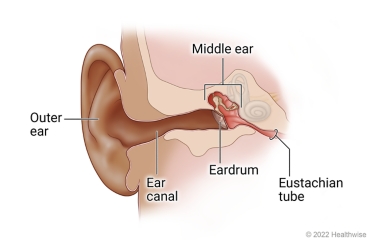
What is an ear infection?
An ear infection is an infection behind the eardrum, in the middle ear. This type of infection is called otitis media. It can be caused by a virus or bacteria.
An ear infection usually starts with a cold. A cold can cause swelling in the small tube that connects each ear to the throat. These two tubes are called eustachian (say "yoo-STAY-shun") tubes. Swelling can block the tube and trap fluid inside the ear. This makes it a perfect place for bacteria or viruses to grow and cause an infection.
Ear infections happen mostly to young children. This is because their eustachian tubes are smaller and get blocked more easily.
An ear infection can be painful. Children with ear infections often fuss and cry, pull at their ears, and sleep poorly. Older children will often tell you that their ear hurts.
How are ear infections treated?
Your doctor will discuss treatment with you based on your child's age and symptoms. Many children just need rest and home care.
Regular doses of pain medicine are the best way to reduce fever and help your child feel better.
- You can give your child acetaminophen (Tylenol) or ibuprofen (Advil, Motrin) for fever or pain. Do not use ibuprofen if your child is less than 6 months old unless the doctor gave you instructions to use it. Be safe with medicines. For children 6 months and older, read and follow all instructions on the label.
- Your doctor may also give you eardrops to help your child's pain.
- Do not give aspirin to anyone younger than 20. It has been linked to Reye syndrome, a serious illness.
Doctors often take a wait-and-see approach to treating ear infections, especially in children older than 6 months who aren't very sick. A doctor may wait for 2 or 3 days to see if the ear infection improves on its own. If the child doesn't get better with home care, including pain medicine, the doctor may prescribe antibiotics then.
Why don't doctors always prescribe antibiotics for ear infections?
Antibiotics often are not needed to treat an ear infection.
- Most ear infections will clear up on their own. This is true whether they are caused by bacteria or a virus.
- Antibiotics kill only bacteria. They won't help with an infection caused by a virus.
- Antibiotics won't help much with pain.
There are good reasons not to give antibiotics if they are not needed.
- Overuse of antibiotics can be harmful. If antibiotics are taken when they aren't needed, they may not work later when they're really needed. This is because bacteria can become resistant to antibiotics.
- Antibiotics can cause side effects, such as stomach cramps, nausea, rash, and diarrhea. They can also lead to vaginal yeast infections.
Follow-up care is a key part of your child's treatment and safety. Be sure to make and go to all appointments, and call your doctor if your child is having problems. It's also a good idea to know your child's test results and keep a list of the medicines your child takes.
Where can you learn more?
Go to http://www.healthwise.net/patientEd
Enter P771 in the search box to learn more about "Learning About Ear Infections (Otitis Media) in Children".
Current as of: October 27, 2024
Author: Ignite Healthwise, LLC Staff
Clinical Review Board
All Ignite Healthwise, LLC education is reviewed by a team that includes physicians, nurses, advanced practitioners, registered dieticians, and other healthcare professionals.

